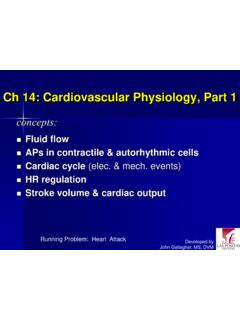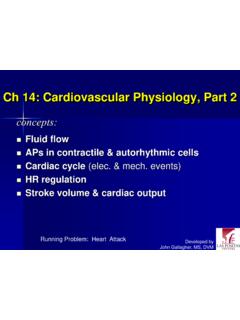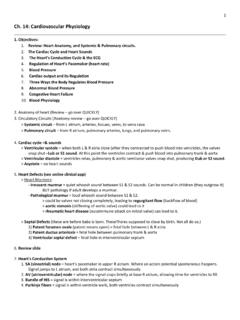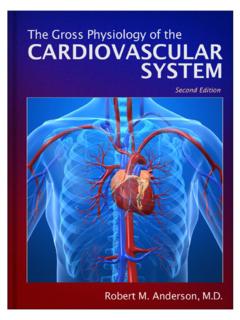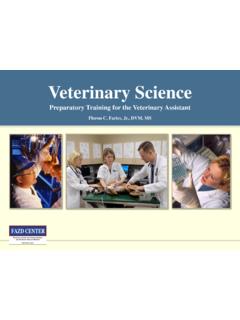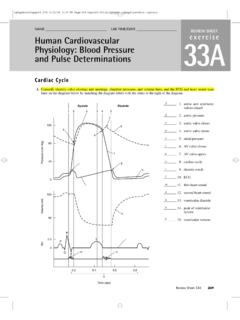Transcription of Medical Cardiovascular and Muscle Physiology
1 Medical AND Muscle Cardiovascular PHYSIOLOGYCOURSE SYLLABUS Course Number: GMS 6474 Credit Hours: 3 credit hours Course Format: This online course is tailored for asynchronous distance learners. COURSE DESCRIPTION Medical Cardiovascular and Muscle Physiology (GMS6474) teaches the functions of Muscle and the Cardiovascular system of human body at a level required for clinical medicine and basic research in Medical Physiology . The course covers normal Physiology , as well as selected diseases. Concepts are taught using a combination of lectures, functional genomics research assignments, online problem sets, and discussion prompts. The problem sets and discussions are designed to test your knowledge of the lectures, and keep you on a comfortable pace with the large amount of content.
2 The research assignments are designed to help the student understand the integration of Cardiovascular Physiology with genetics, genomics, molecular biology, and cellular Physiology as a basis for a better understanding of human disease. Each recorded lecture lasts between 20 and 30 min. TARGET AUDIENCE This course is designed to meet the needs of individuals wanting to pursue a career in medicine, biomedical research, or in teaching topics related to Physiology and medicine. For example, this course is designed to provide critical knowledge for individuals who wish to teach Cardiovascular Physiology at the secondary and post-secondary levels. However, this course will also provide a foundation for students who are wishing to attain or enhance knowledge of Medical Cardiovascular and Muscle Physiology .
3 PREREQUISITES This course requires a BA or BS and a strong science foundation with at least 5 full semester courses related to Biology, chemistry and/or physics. A minimum undergraduate GPA = is required for admission. Co- enrollment or prior passing grade in GMS 6440 required for enrollment in this class. CONTACTS Erin Bruce, , Lecturer, Department of Physiology and Functional Genomics. Please use the email function within Canvas to contact Dr. Bruce. A response should be expected within 1-2 business days. SCHEDULE This is a self-paced course that is offered in the fall, spring, and summer. There are problem sets and discussions due weekly, and 3 research assignments due throughout the semester.
4 COURSE GOALS The goal of this course is for students to develop an understanding of the integrated functions of the Cardiovascular and Muscle systems in the human body; as well as problem solving and critical thinking skills in evaluating clinical situations. This course will provide: 1) a foundation understanding of the basic functions of the Muscle and the human Cardiovascular system; 2) integration of individual facts for the purposes of understand how organ systems work independently and interdependently in the body; 3) examples of clinical situations in which integration of Muscle and Cardiovascular knowledge is used to diagnose and treat patients. LEARNING OUTCOMES Upon completion of this course, students will be able to: the structure and functions of skeletal, cardiac Muscle , and smooth Muscle duringcontraction and relaxation.
5 Apply this knowledge to scenarios of exercise and disease. This willbe assessed by weekly problems set with multiple choice and short answer questions, anddiscussion the normal function and regulation of the Cardiovascular system, and explain the manyadaptations that occur in response to exercise, the environment, or disease. This will beassessed by weekly problems set with multiple choice and short answer questions, anddiscussion the knowledge of these systems, while explaining how they act in an integrated mannerto regulate overall body functions. This will be assessed by weekly problems set with multiplechoice and short answer questions, discussion prompts, research assignments, and acumulative multiple choice how failure of these normal physiologic functions and integrations are associated withsome diseases.
6 This will be assessed by research RESOURCES video lectures with PowerPoint presentations will be provided on the course video clinical correlation(s) and/or case studies relating to the basic science notes for each video lecture are available as PDF downloads enabled for direct text: Student may wish to supplement the course videos and PDF handout bypurchasing an online version of "Berne & Levy Physiology , 7th Edition" 2018. Author: Bruce & Bruce A. Stanton. ISBN: Supplements: All UF students have free online access to the resources availableat Access Medicine ( ) through UF libraries. Ganong s Review of Medical Physiology , 25e 2016. Authors: Kim E. Barrett, Susan M. Barman, Scott Boitano, and Heddwen L. Brooks. ISBN: 9780071825108 Cardiovascular Physiology , 9e 2018.
7 Mohrman and Heller. Lange McGraw-Hill Education. ISBN: 9781260026116 COMMUNICATION WITH FACULTY If you have questions about the material or the course, please contact the course director (Dr. Erin Bruce) using the email function in Canvas. STRUCTURE OF CONTENT The course content is structured into sub-topical groups of lectures that are accompanied by Discussion Prompts and Problem Sets. Discussion prompts are designed to promote critical thinking of the content and prepare students for the problem sets. Problem sets are designed to help the student master the course material. These problem sets and discussion prompts are completed as take-home assignments (open book and open notes), but are graded. There are 3 Functional Genomics Research Assignments, which are designed to help the student integrate the concepts of Physiology with functional genomics and human diseases of genetic origin.
8 These self-guided research assignments are also completed as take-home assignments and are also graded. COURSE CALENDAR AND RECOMMENDED TIME MANAGEMENT The videos and corresponding PDF notes are available throughout the entire time the course is open, from the first day through the end of the course on the day the grades are reported to the Registrar. However, the Exam is open ONLY during the window of time shown on the website. The course content lecture titles should be viewed in the order shown later in this syllabus. Discussions and Problem Sets are due weekly as there is a large amount of content, and a weekly pace helps students keep up with the material. Please note the due dates in your calendar. EXAMINATION AND GRADING There will be one multiple choice examination covering the material taught in the lectures.
9 The exam will be monitored by ProctorU, a UF chosen service that allows the students to complete their exams at home while still ensuring academic integrity. Students will take the exam at a computer that meets the technical requirements of ProctorU, including a web cam and microphone (please review the technical requirements found on the ProctorU support page). Students will make the arrangements for exam proctoring. The exam may be taken any time during the window of availability; however, it can only be taken once. We recommend you make an appointment with ProctorU at least two weeks in advance of your preferred exam date. All costs of the exam are covered in the registration costs. Scores are reported as a percent.
10 The points used to compute final grades will be determined after all assignments and the exam have been completed. GRADING SCALE: A numerical grade will be given at the end of the course and will be scored as follows, per University of Florida standards: 93-100% = A90-92% = A-87-89% = B+83-86% = B80-82% = B-77-79% = C+73-76% = C70-72% = C-67-69% = D+63-66% = D<63% = EProblem Sets 30% of the total grade Functional Genomics Research Assignments 30% of the total grade Final Exam 30% of the total grade Discussion Participation 10% of the total grade GRADING POLICY: There are no make-up exams unless otherwise granted by the course coordinator prior to an examination date. Failure to take an exam without prior permission from the course coordinator will be recorded as 0.



